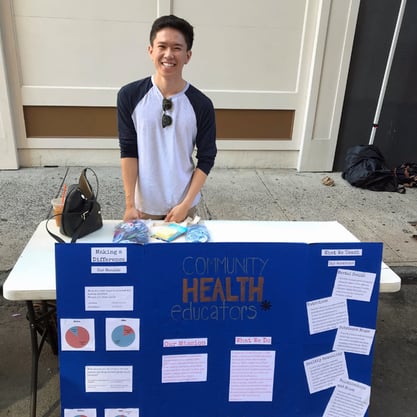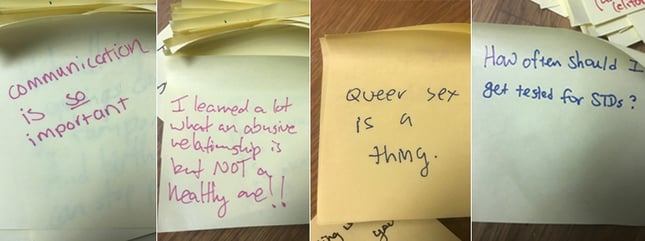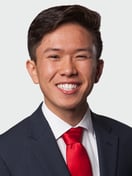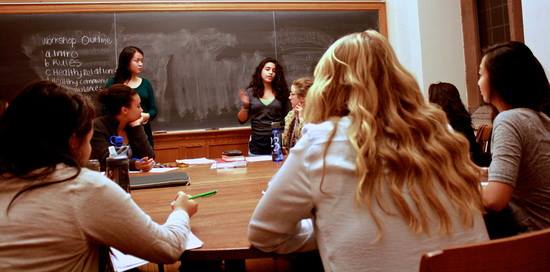Reminiscing on my high school and middle school career, I recognize how fortunate I was to have at least some exposure to a health-related curriculum, albeit one that emphasized an abstinence-only doctrine alongside marginal mention of male and female anatomy. In all honesty, this curriculum was neither thorough, extensive, nor receptive to feedback and questions from students; rather, my “health education” encompassed a single hour-long video projected on a whiteboard as about fifty or so students, packed like sardines into a classroom among our creaky wooden tables and plastic purple seats, whispered and giggled amongst ourselves. Afterwards, we were handed a stick of deodorant and hurriedly ushered out of the room by a cohort of instructors that seemed fearful of the looming possibility that a child may inquire about what “sex” is.
Today, I find myself both lucky and privileged to attend a college with the capacity and resources to thoroughly educate its students on making healthy decisions both in our everyday lives and also to better inform our choices about our intimate experiences. In this environment, I have discovered like-minded peers who express a similar discontent with the current state of health education in public secondary school systems. A few years back, a group of undergraduates coalesced to form the Community Health Educators, an organization dedicated to providing thorough, fact-based health workshops both in local New Haven schools and to incoming first-year students at Yale. This comprehensive curriculum is comprised of five different topics: mental health, nutrition & substance abuse, healthy sexuality, STIs and contraception, and relationships & abuse. During my first-year, I had the pleasure of volunteering as a mental health workshop educator, and oftentimes, I backtrack and imagine how profound the impact that learning about cultivating positive mental health may have had on me as a fourteen-year-old.

Wells Fargo Point Scholar Aiden Lee at New Haven Pride
This year, my involvement with the Community Health Educators has been to nudge the group to be even more cognizant of including the perspectives of LGBTQ+ students in the conversation about health. Currently, many of our workshops—especially our healthy sexuality workshop—already cover topics including the spectrums of sexuality and gender identity. In addition, we have included recommendations for PrEP as an effective means of mitigating the risk of contracting HIV+. Beyond this, I hoped that I could bring our educators into more dialogue with the greater community that we work with. That is why this year, for the first time, I brought the Community Health Educators to table at New Haven Pride which occurs in mid-September. Our involvement at the block party was dual-pronged, one of which was handing out safe-sex materials including condoms, lube, and dental dams provided by the College Dean’s Office. One notable takeaway for me was the lack of regular accessibility to dental dams for many people; oftentimes, people have not heard of what dental dams are and how they are used. In my own experience, dental dams seem to be an underutilized barrier method of preventing STIs that are not as visibly promoted as other barrier methods including condoms. In addition to providing safe-sex materials, we wanted to have an activity that engaged with the Pride celebrators who visited our table, so we incorporated an opportunity for people to respond to the question, “what do you wish you learned in a high school health class?” We provided participants with sticky notes, so they could write their feedback and post their answers on our poster board.

Personally, I valued having the experience to receive input from the LGBTQ+ community about how we can make health-education curriculums more affirming and relevant for non-cis, non-straight populations. Moving forward, I hope that the Community Health Educators continue to participate annually in New Haven Pride—not only does it serve as a link between us and the populations we work with, but it also functions as an avenue to make our curricula more reflective and applicable to a wider audience.
As we continue to advocate for the implementation of more comprehensive health education in secondary education systems, I implore all communities to recognize the importance of adopting and focusing on queer voices in the conversation. Our current political climate may incite a turning point in how American youth may be introduced to decision-making regarding health and intimate relations, but we cannot allow for change to continue to marginalize and discount LGTBQ+ populations. Together, we must keep the conversation going. We must inform progress, and we must endure in our commitment to ensure that progress leaves no voices unheard.
 This post was written by Wells Fargo Point Scholar Aiden Lee.
This post was written by Wells Fargo Point Scholar Aiden Lee.
Aiden is studying Economics and Psychology at Yale University. Back home in Arizona, Aiden was a Board Director of the Southern Arizona AIDS Foundation, an organization dedicated to providing care and education for those living with HIV/AIDS as well as the LGBTQ community. He plans to continue being an advocate for equality and justice at Yale. Read more about Aiden here.

